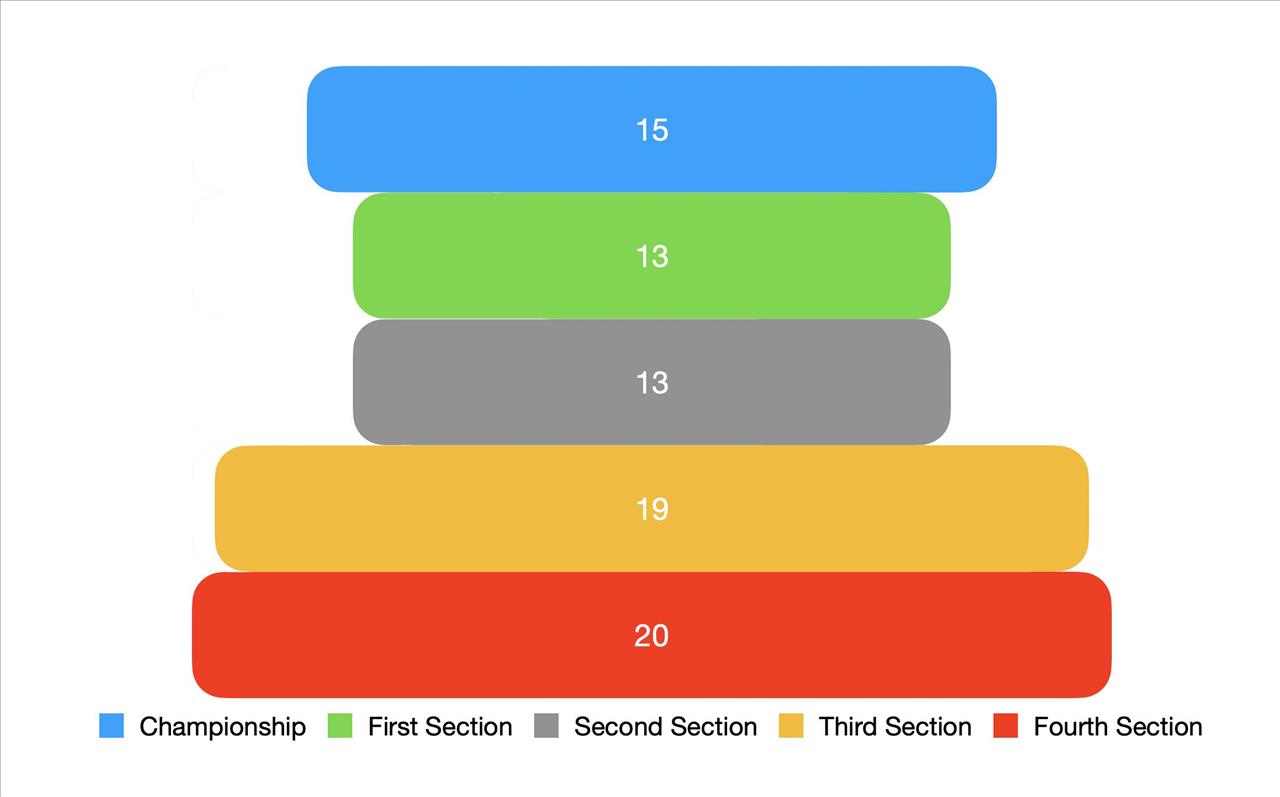
If we are serious about trying to come up with a new structure for the series of Regional contests, plus the Scottish and Welsh Championships for the next decade and more, then there must be a foundation stone laid to initiate constructive debate.
This is what this article sets out to achieve.
Let’s be clear though.
This is not purporting to be the definitive answer. Neither does it employ a methodology to exclude bands with a form of perceived injustice of not being able to compete in the section they feel they deserve to be in.
Subjective emotion has to be put to one side. It is the brass band movement as a whole in the UK that ‘deserves’ a structure that has a workable balance that rewards excellence as well as encourages inclusion, and that more accurately reflects the quality as well and quantity of those that take part.
This is not purporting to be the definitive answer. Neither does it employ a methodology to exclude bands with a form of perceived injustice of not being able to compete in the section they feel they deserve to be in.
We have looked at the grading tables in each region and at the rankings on 4BR and Brass Stats to assess the structures.
First step exercise
This then is simply a first step exercise to provide a flexible template that may form the basis on which future change can be built. Its aim is to get people talking and discussing the arguments for and against a fundamental change of approach to our unique form of competitive music making.
There will be anomalies of course – no system is perfect.
It is hoped this is a starting point to come up with a system that that reflects our communal desire for musical excellence to broaden the base of inclusion (especially at the foundation level in the Fourth Section) and ultimately the appeal of the brass band contest to the general public.
However, by trying to build a ‘pyramid’ structure that must also work hand in hand with a re-evaluation of the rules regarding registration, player numbers, music selection, promotion and relegation, adjudication and even geographical location (for the English regions), it will also hopefully invigorate a culture of joint working to solve them.
Everyone has a part to play; players, conductors, supporter, adjudicators, composers and administrators - even the brass band media.
It is hoped this is a starting point to come up with a system that that reflects our communal desire for musical excellence to broaden the base of inclusion (especially at the foundation level in the Fourth Section) and ultimately the appeal of the brass band contest to the general public.
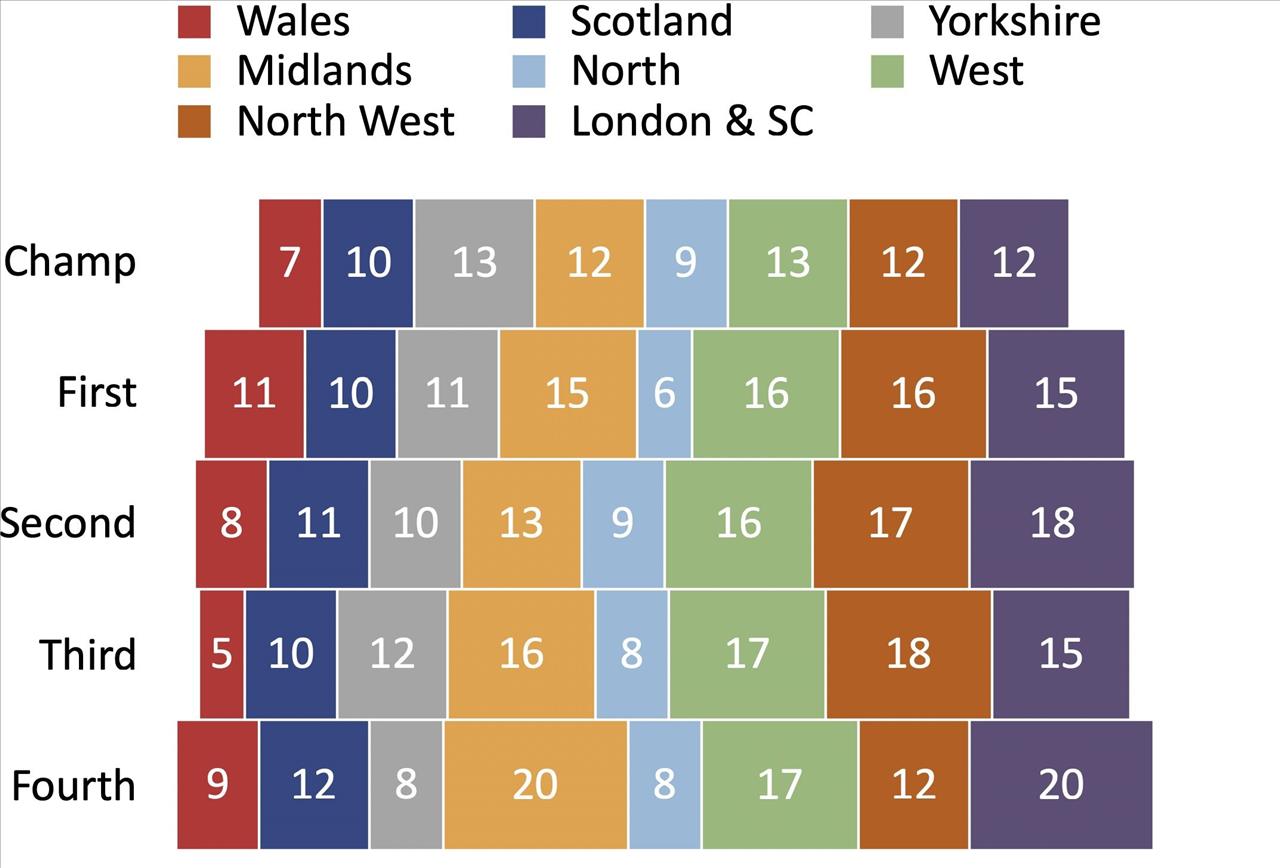
The structure as of 2019 in the UK
Argument for change
In the 4BR article; ‘The shape of things to come – the right time for a debate on a new National structure’, the basic outline for the argument for change was given.
It highlighted system failure; a time line of well meaning intentions that became clogged up by an adherence to outdated and inflexible regulation – primarily the rules regarding promotion and relegation.
Any new system should therefore start from scratch - and this is what this initial template for each ‘region’ undertakes to do.
It would also be hoped that bands from Northern Ireland would be invited to become part of the set-up as a ninth ‘region’ of its own (much like Scotland and Wales).
The 2019 NIBA Championship consisted of 16 bands in the Championships to Fourth Grade sections. We have included 1 representative band in each section qualifying for the National Final.
Regional structures:
The initial template would envisage three ‘regional’ structure types based on the number of competing bands.
Structure 1: up to 49 bands in region
Structure 2: 50 - 74 bands in a region
Structure 3: 75 plus bands in a region
We have used the total number of bands that actually took part in each ‘region’ in 2020 as our starting point.
We have assumed that the same number of bands would have performed at the London & Southern Counties Regional Championships in 2020 as took part in 2019 (80)
It is also important to note that these are the figures for the bands that competed that year and not the total number of graded bands in each ‘region’.
Wales for instance has 51 graded bands, North (42); Scotland (55); Yorkshire (58); North West (80); Midlands (83); West of England (84) and London & Southern Counties (85).
If all graded bands took part there would of course be some potential amendments, but at present the difference between the figures still makes for manageble contest day logistics.
Promotion and relegation would be based over a 3 year period.
Structure 1:
North of England (38 bands in 2020)
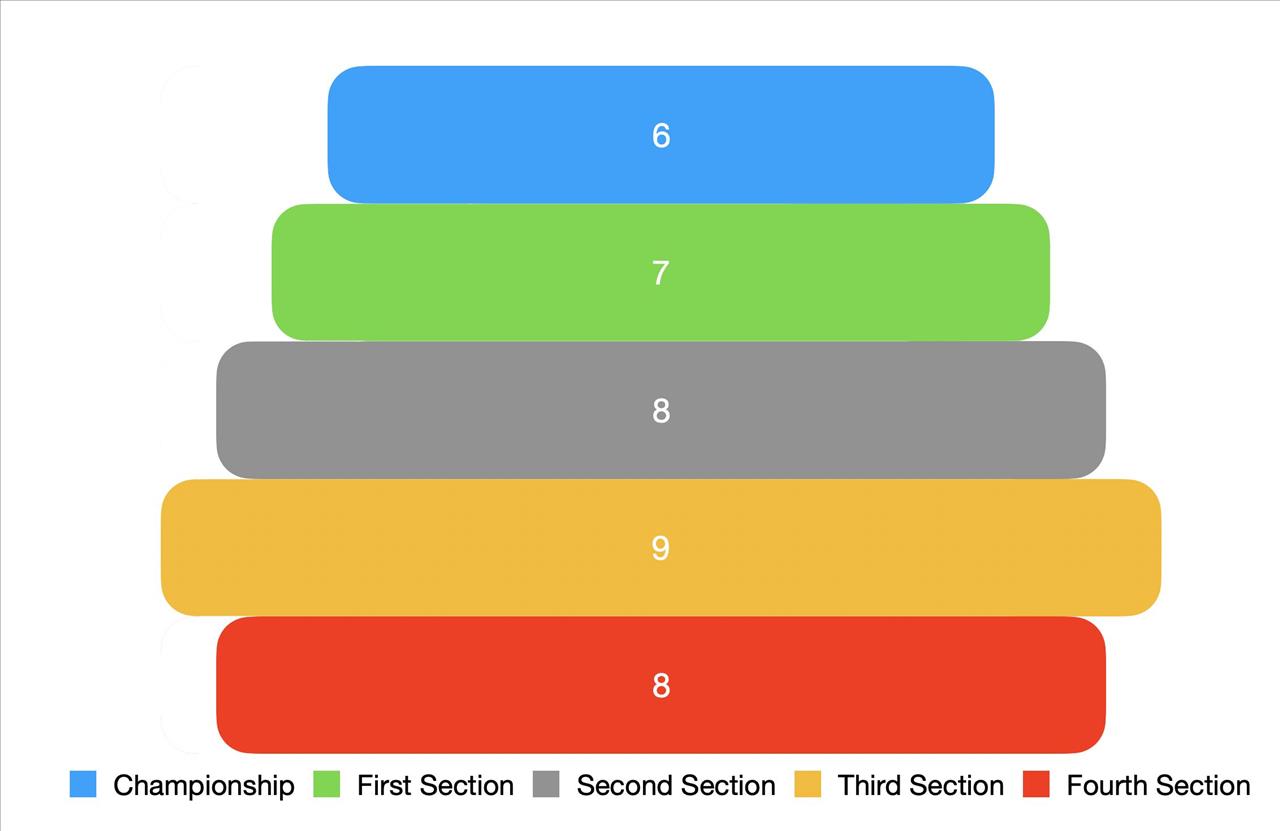
Championship Section: Maximum of 6 bands
1 band qualifies for National Final
1 band relegated each year
First Section: Maximum of 7 bands
1 band qualifies for National Final
1 band promoted and 1 band relegated
Second Section: Maximum of 8 bands
1 band qualifies for National Final
1 bands promoted and 1 band relegated
Third Section: Maximum of 9 bands
1 band qualifies for National Final
1 bands promoted and 2 bands relegated
Fourth Section: No maximum (8 bands currently)
1 band qualifies for National Final
2 bands promoted
Wales (40 bands in 2020)
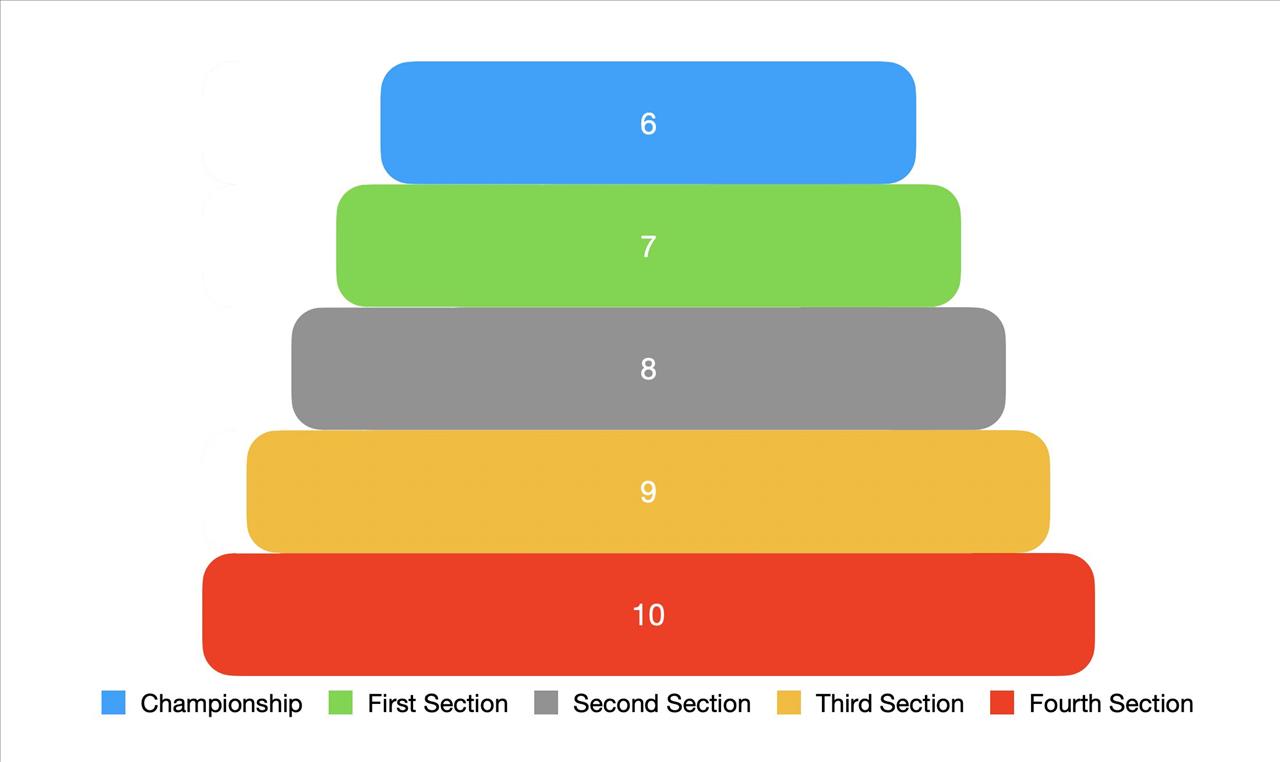
Championship Section: Maximum of 6 bands
1 band qualifies for National Final
1 band relegated each year
First Section: Maximum of 7 bands
1 band qualifies for National Final
1 band promoted and 1 band relegated
Second Section: Maximum of 8 bands
1 band qualifies for National Final
1 bands promoted and 1 band relegated
Third Section: Maximum of 9 bands
1 band qualifies for National Final
1 bands promoted and 2 bands relegated
Fourth Section: No maximum (10 bands currently)
1 band qualifies for National Final
2 bands promoted
Structure 2:
Yorkshire (53 bands in 2020)
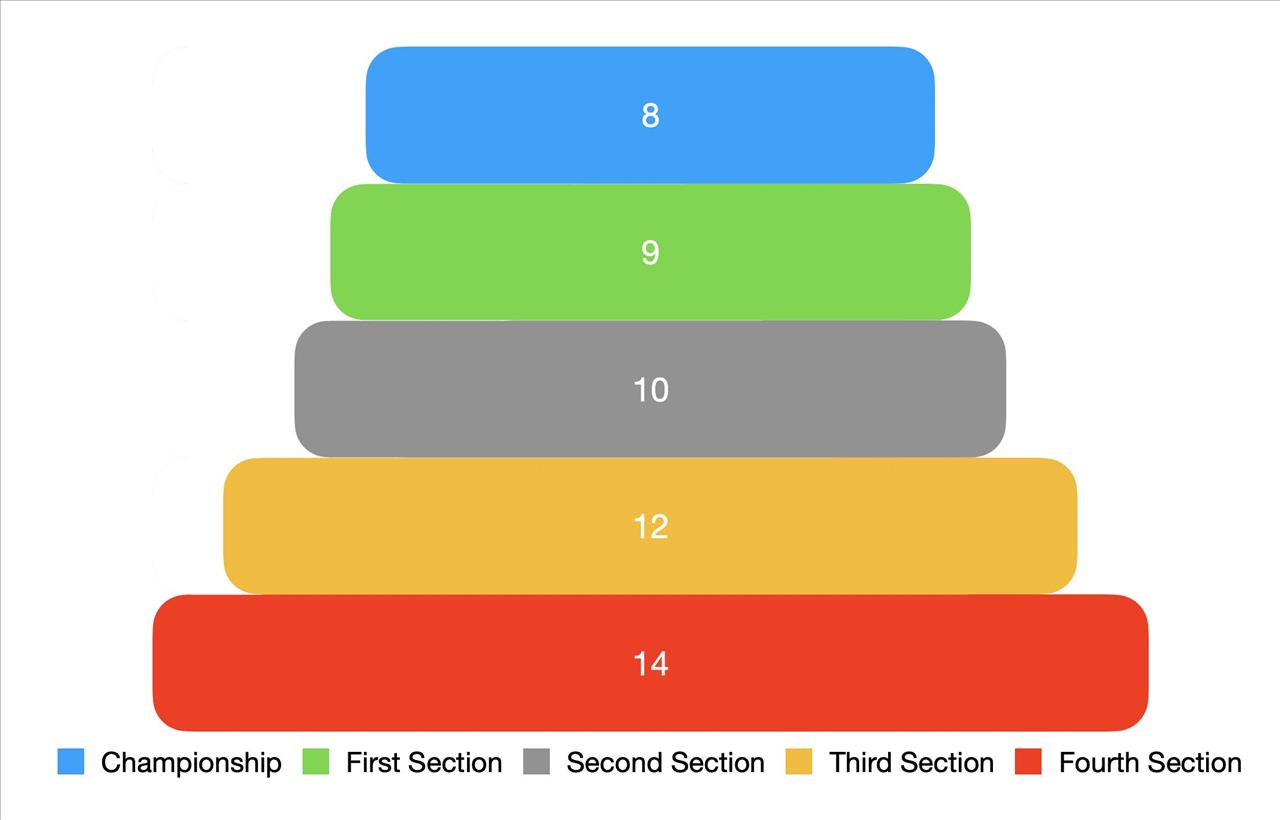
Championship Section: Maximum of 8 bands
1 band qualifies for National Final
1 band relegated each year
First Section: Maximum of 9 bands
1 band qualifies for National Final
1 band promoted and 1 band relegated
Second Section: Maximum of 10 bands
1 band qualifies for National Final
1 bands promoted and 2 bands relegated
Third Section: Maximum of 12 bands
2 bands qualify for National Final
2 bands promoted and 2 bands relegated
Fourth Section: 13 bands or more (14 bands currently)
2 bands qualify for National Final
2 bands promoted
Scotland (54 bands in 2020)
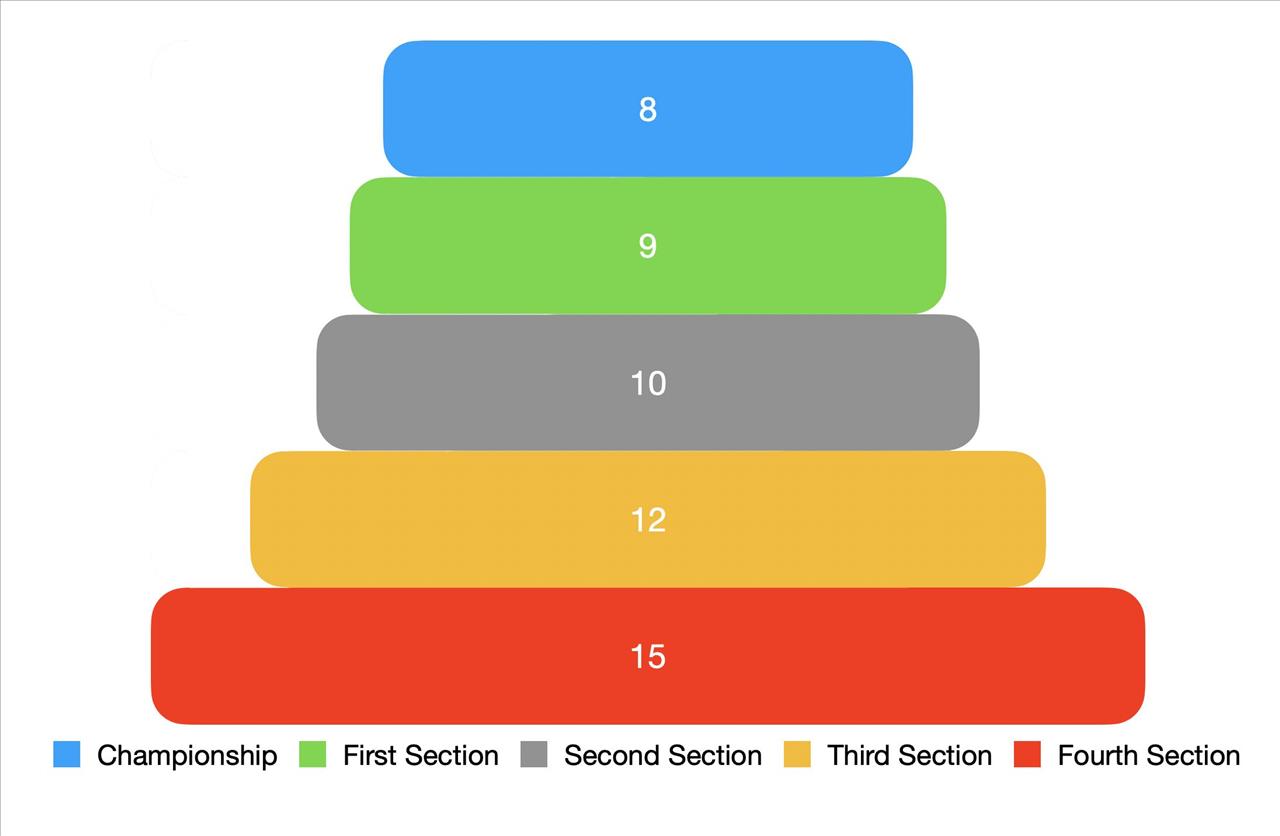
Championship Section: Maximum of 8 bands
1 band qualifies for National Final
1 band relegated each year
First Section: Maximum of 9 bands
1 band qualifies for National Final
1 band promoted and 1 band relegated
Second Section: Maximum of 10 bands
1 band qualifies for National Final
1 bands promoted and 2 bands relegated
Third Section: Maximum of 12 bands
2 bands qualify for National Final
2 bands promoted and 2 bands relegated
Fourth Section: 13 bands or more (15 currently)
2 bands qualify for National Final
2 bands promoted
Structure 3:
North West (78 in 2020)
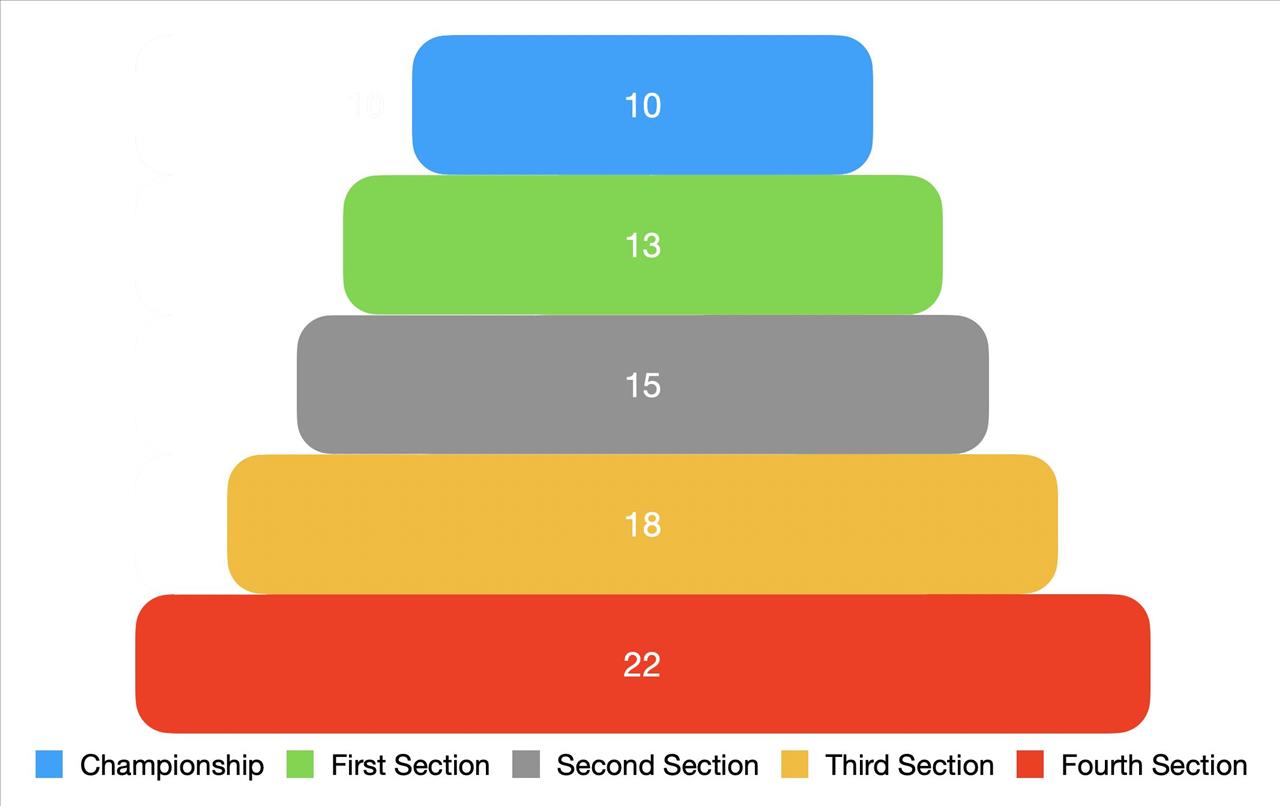
Championship Section: Maximum of 10 bands
1 band qualifies for National Final
1 band relegated each year
First Section: Maximum of 13 bands
2 bands qualify for National Final
1 band promoted and 2 bands relegated
Second Section: Maximum of 15 bands
2 bands qualify for National Final
2 bands promoted and 2 bands relegated
Third Section: Maximum of 18 bands
3 bands qualify for National Final
2 bands promoted and 3 bands relegated
Fourth Section: 19 bands or more (22 currently)
3 bands qualifies for National Final up to 23 bands entered (4 bands qualify from 24 or more)
3 bands promoted
Midlands (78 bands in 2020)
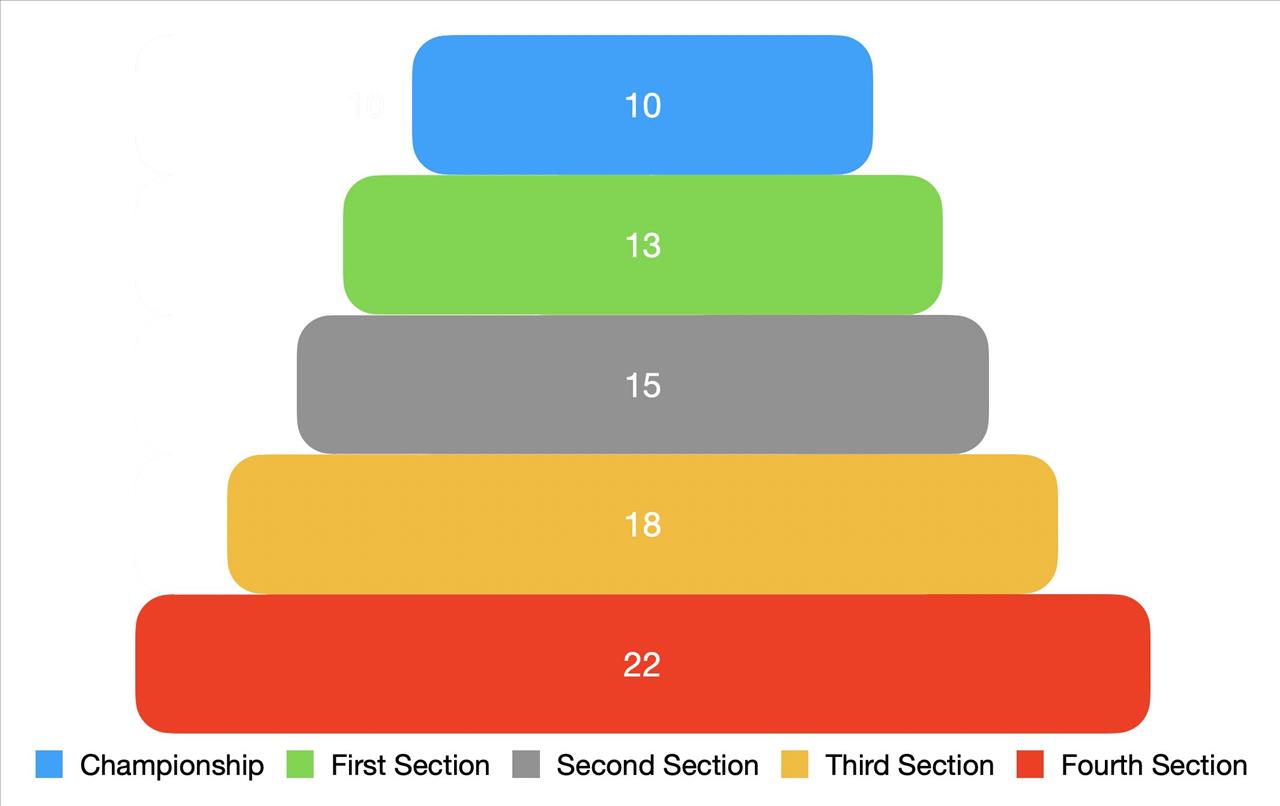
Championship Section: Maximum of 10 bands
1 band qualifies for National Final
1 band relegated each year
First Section: Maximum of 13 bands
2 bands qualify for National Final
1 band promoted and 2 bands relegated
Second Section: Maximum of 15 bands
2 bands qualify for National Final
2 bands promoted and 2 bands relegated
Third Section: Maximum of 18 bands
3 bands qualify for National Final
2 bands promoted and 3 bands relegated
Fourth Section: 19 bands or more (22 currently)
3 bands qualifies for National Final up to 23 bands entered (4 bands qualify from 24 or more)
3 bands promoted
West of England (79)
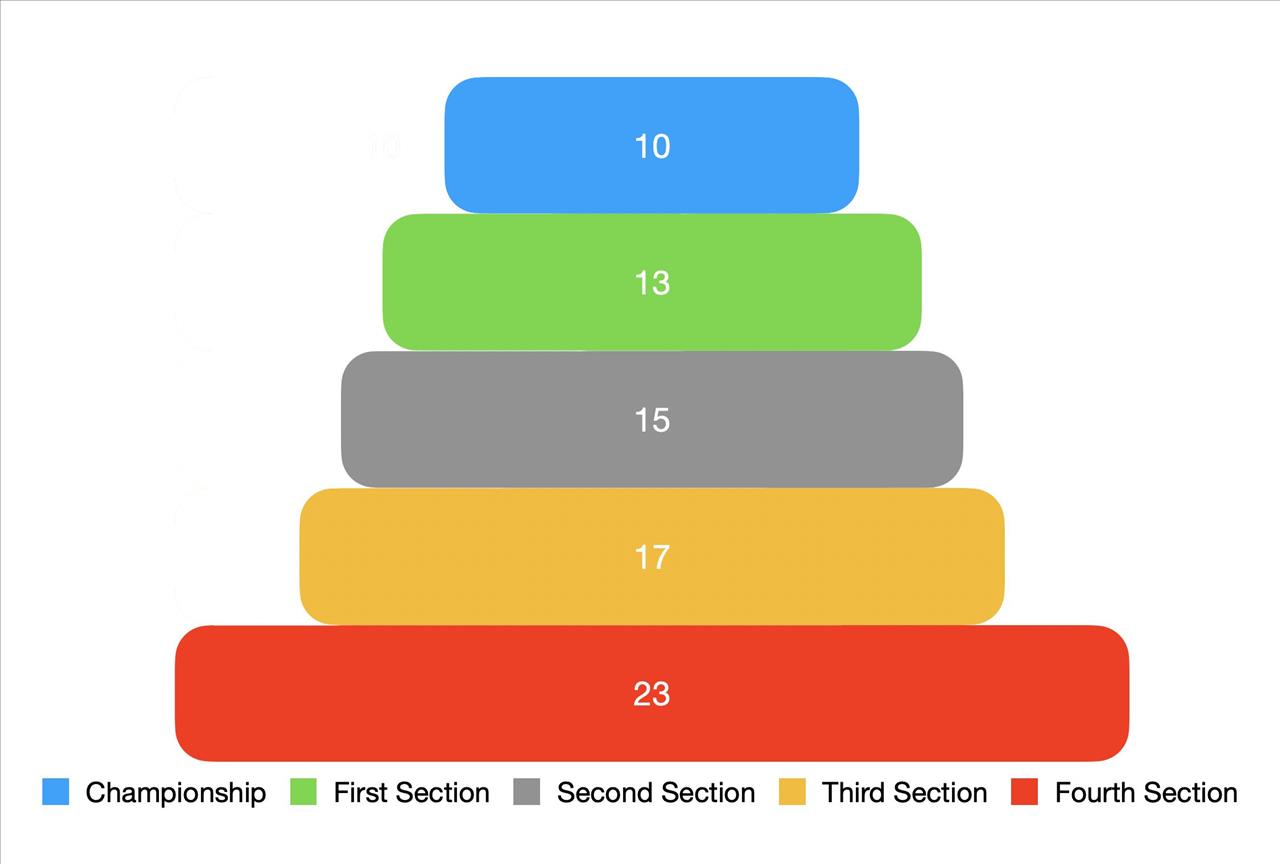
Championship Section: Maximum of 10 bands
1 band qualifies for National Final
1 band relegated each year
First Section: Maximum of 13 bands
2 bands qualify for National Final
1 band promoted and 2 bands relegated
Second Section: Maximum of 15 bands
2 bands qualify for National Final
2 bands promoted and 2 bands relegated
Third Section: Maximum of 18 bands
3 bands qualify for National Final
2 bands promoted and 3 bands relegated
Fourth Section: 19 bands or more (23 currently)
3 bands qualifies for National Final up to 23 bands entered (4 bands qualify from 24 or more)
3 bands promoted
London & Southern Counties (80 in 2020)*
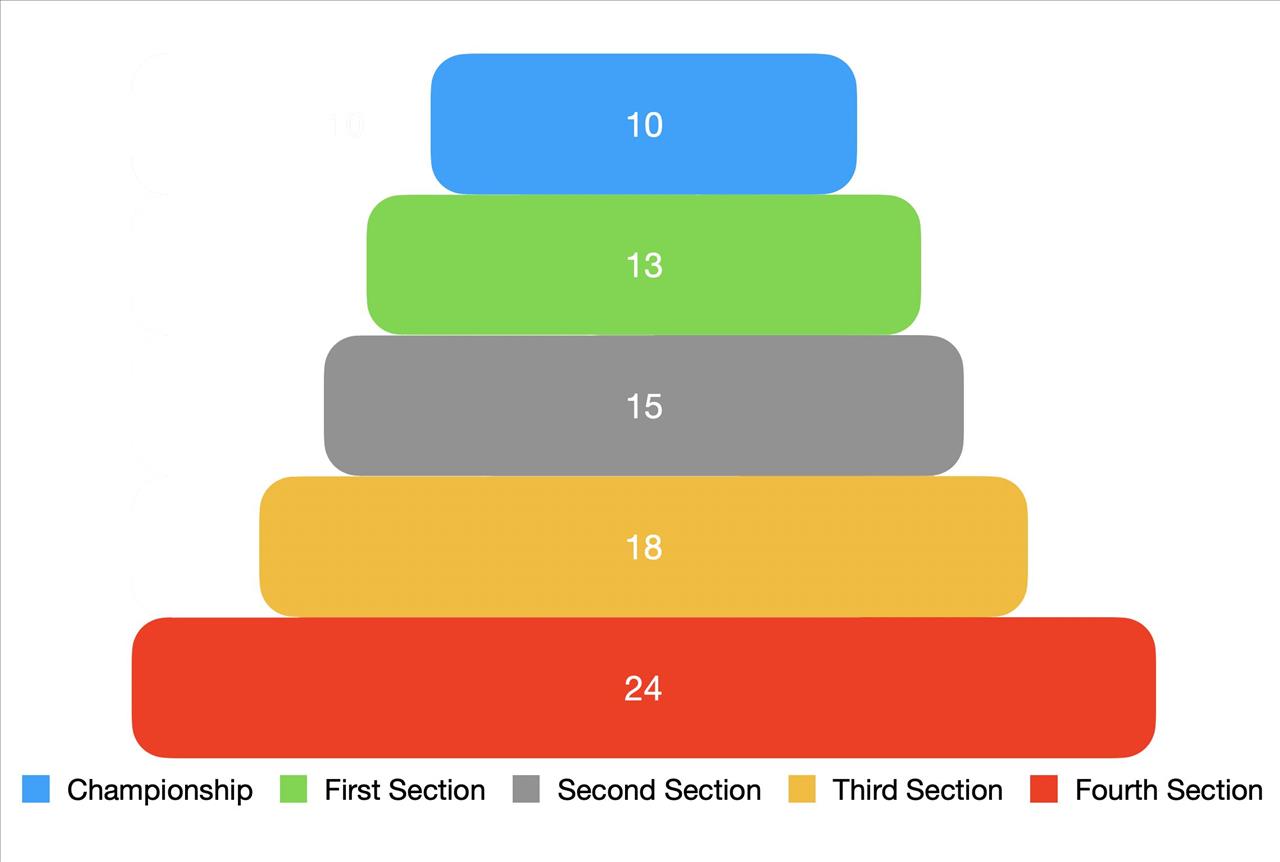
Championship Section: Maximum of 10 bands
1 band qualifies for National Final
1 band relegated each year
First Section: Maximum of 13 bands
2 bands qualify for National Final
1 band promoted and 2 bands relegated
Second Section: Maximum of 15 bands
2 bands qualify for National Final
2 bands promoted and 2 bands relegated
Third Section: Maximum of 18 bands
3 bands qualify for National Final
2 bands promoted and 3 bands relegated
Fourth Section: 19 bands or more (24 currently)
3 bands qualifies for National Final up to 23 bands entered (4 bands qualify from 24 or more)
3 bands promoted
*Same number of 2019
National Final qualification:
There is little doubt that the National Finals at London and Cheltenham (or future venues) will in future need to both financially affordable to the competing bands and a much more appealing ‘user friendly’ experience for its audience.
Quality rather than quantity is surely the key. Fewer bands may seem to fly in the face of tradition, but it would allow for both competitors and supporters alike to find much more flexible approaches to successfully attending the events.
Championship Section:
The top six bands at the previous year’s National Final would gain automatic qualification for the following year’s contest. Each band would however have to compete at their ‘Area’ contest.
They would be joined by nine ‘Area’ representatives (the appropriate highest placed band in each Area)
Total number of bands at the National Final = 15
This regional template is not an exercise in trying to justify comparison between one region and another - that is what the National Final in London would show.
This would of course mean a reduction of 25% in the number of competing bands at the Albert Hall event, but it could be argued that this would actually increase extra audience interest through the ability to choose a wider variety of major works, plan a less congested contest day, and make for a much more audience friendly experience in terms of travel and accommodation considerations.
It would also make redundant the argument that one region has more 'top section' bands in terms of perceived quality than another.
This regional template is not an exercise in trying to justify comparison between one region and another - that is what the National Final in London would show.
The minimum number of bands that could quailfy for the Royal Albert Hall would be 1 from any region. The maximum would be 7 (the top six plus the appropriate highest placed band.
Sections 1 - 4:
Up to 12 bands = 1 qualifier
13 to 17 bands = 2 qualifiers
18 to 23 bands = 3 qualifiers
24 bands plus = 4 qualifiers
There would be no automatic promotion for a National Champion.
In 2019 Cheltenham hosted 70 bands in its four National Finals over two days
Under the new system it would host 65.
First Section: 13 bands at National Final (16 in 2019)
Second Section: 13 bands at National Final (18 in 2019)
Third Section: 19 bands at National Final (18 in 2019)
Fourth Section: 20 bands at National Final (18 in 2019)
Music, adjudication, regulation:
It would be hoped that be linking the process of quality and quantity together the Kapitol Music Panel would also be free in their thinking.
A potential proposal for the Regional Championships would be to retain a fixed set-work for the Championship and First Section.
A choice of 2 works for the Second Section and 3 for the Third Section. A combination choice of one of 5 marches plus one of 5 hymn tune selections and one of 5 ensembles pieces for the Fourth Section.
Open adjudication to be employed in the Third and Fourth Sections. Closed adjudication in the Championship, First and Second.
No restrictions on player numbers in the Fourth Section, and up to 40 players in the Third Section. Up to 35 players in the Second Section. Current rules remain in place for First and Championship Section.



